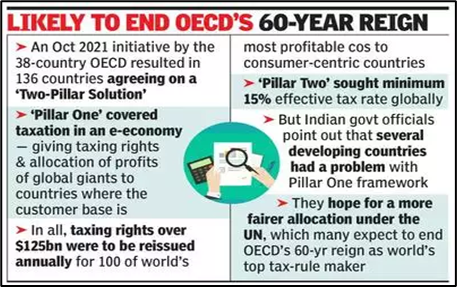In a 1st, UN to Call Shots on Global Tax Rules
26-08-2023
12:19 PM
1 min read

What’s in today’s article?
- About OECD and its Pillar two rules
- News Summary
Why In News?
- Recently, the United Nations (UN) General Assembly unanimously accepted a resolution sponsored by Nigeria that advocates for the creation of an international tax cooperation mechanism.
- With this mechanism, emerging countries in Africa and Asia are expected to have a greater say in the formulation of global tax regulations.
- As a result, the OECD's (Organisation for Economic Co-operation and Development) 60-year reign as a global tax rule maker is coming to an end.

OECD (Organisation for Economic Co-operation and Development):
- It is an intergovernmental organisation founded in 1961 (under the Rome Treaties of 1957) with 38-member countries, which describe themselves as committed to democracy and the market economy.
- It was to stimulate economic progress and world trade by providing a platform to compare policy experiences, seek answers to common problems, identify good practices and coordinate domestic and international policies of its members.
OECD's Pillar Two model rules:
- These rules were agreed in 2021 by 137 countries and jurisdictions under the OECD/G20 Inclusive Framework on BEPS.
- Base erosion and profit shifting (BEPS) refers to corporate tax planning strategies used by multinationals to shift profits from higher-tax jurisdictions to lower/no-tax jurisdictions, thus eroding the tax-base of the higher-tax jurisdictions.
- The OECD defines BEPS strategies as exploiting gaps and mismatches in tax rules.
- The rules provide governments a precise template for taking forward the two-pillar solution to address the tax challenges arising from digitalisation and globalisation of the economy.
- Pillar 1 aims to ensure a better distribution of taxation of multinationals according to the countries in which they operate.
- Pillar 2 aims to control tax competition on corporate profits by introducing a global minimum tax of 15% from 2023.
- The rules specify the scope and mechanism for Pillar Two's so-called Global Anti-Base Erosion (GloBE) rules.
- The new Pillar Two model rules will assist countries to bring the GloBE rules into domestic legislation in 2022. The GloBE rules:
- Define the MNEs within the scope of the minimum tax;
- Set out a mechanism for calculating an MNE’s effective tax rate on a jurisdictional basis; and
- Impose the top-up tax on a member of the MNE group in accordance with an agreed rule order.
- Significance of Pillar Two rules:
- More than $125 billion in taxing rights were to be redistributed each year from about 100 of the world's largest and most profitable MNEs to consumer-centric countries.
- This would ensure that large corporations pay their fair share of taxes everywhere they operate and make profits.
- While the OECD is seen as a rich-country club, the rules show that it has become increasingly liberal in its approach to non-members such as India.
News Summary:
- Concerns regarding Pillar Two rules:
- Pillar 1 a contentious issue among several developing countries. It provides that no newly enacted digital services tax (like India’s equalisation levy) will be imposed on any company till the coming into force of the Pillar 1 agreement.
- According to India, the equalisation levy was a temporary solution that could be repealed once Pillar 1 was implemented.
- Pillar 2, with a mechanism for tax back by another country if the minimum rate was not adhered to, remains a hiccup in the negotiation.
- Pillar 1 a contentious issue among several developing countries. It provides that no newly enacted digital services tax (like India’s equalisation levy) will be imposed on any company till the coming into force of the Pillar 1 agreement.
- Significance of the UN tax convention:
- It would overhaul global taxation rules, end global tax abuse by multinational enterprises (MNEs) and the super-rich.
- It could result in a larger number of companies (rather than just the top 100) coming within the ambit of a fairer customer-centric based profit allocation.
- In addition to dealing with tax issues in a digital economy, the convention is also expected to deal with the menace of illicit money flows and solutions to overcome the same.
- It will now kick off a power struggle between the two institutions (UN and OECD) with implications for global and local economies, businesses and people everywhere for decades to come.

